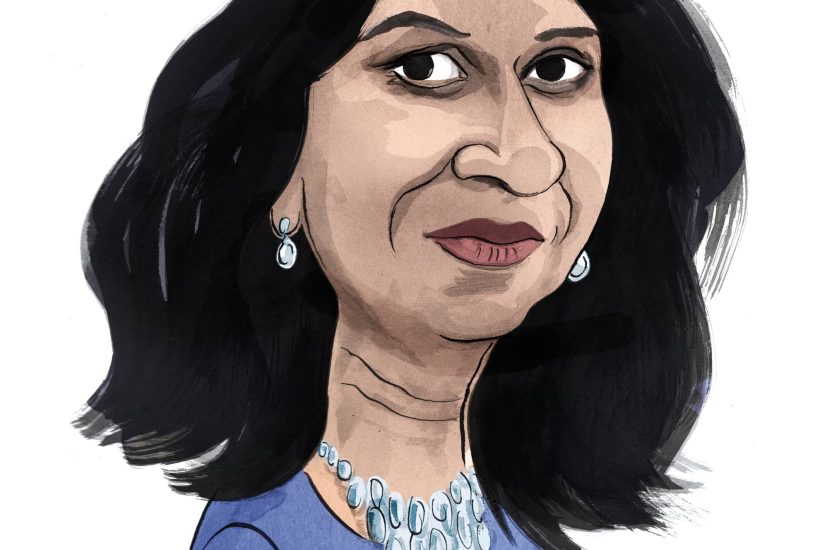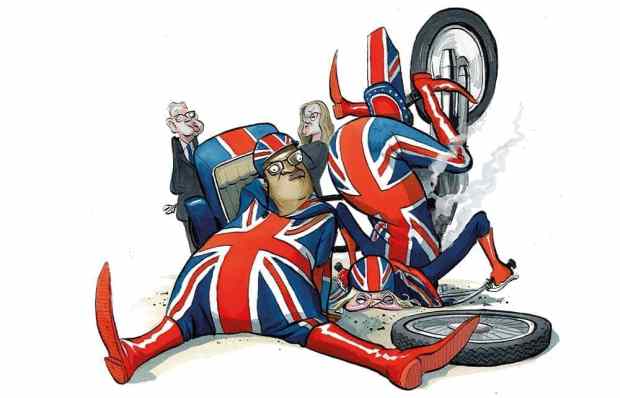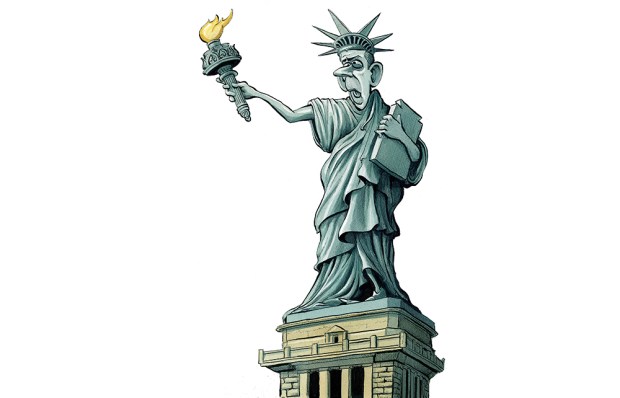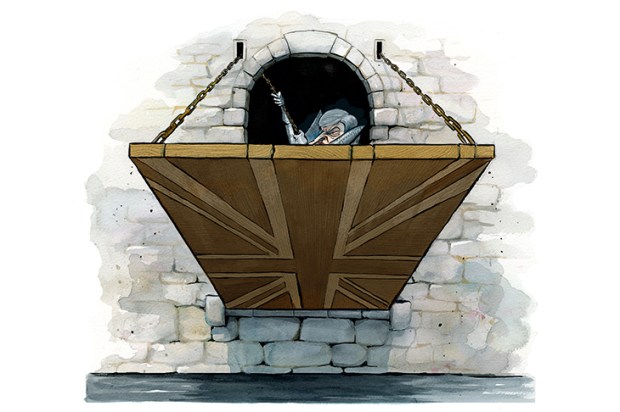During her leadership bid, Suella Braverman positioned herself as a Tory maverick – a firm believer in Brexit, a campaigner for low taxes, and a defender of controlled immigration. Once her campaign ended, she backed Liz Truss because, she said, she wanted to join a team that would change things. When Kwasi Kwarteng announced he would abolish the 45p rate of tax on highest salaries, she was delighted. And when Michael Gove and others rebelled against the plan, she accused them of orchestrating a ‘coup’.
We meet a few hours after her remarks, at a Spectator event at the Tory party conference in Birmingham. She’s a little late, given the kerfuffle caused by a home secretary talking about a coup. ‘That word has followed me everywhere,’ she says. Kemi Badenoch, her cabinet colleague, called her language ‘inflammatory’. Does Braverman regret speaking in such terms? ‘I don’t think I’ve gone too far,’ she says. She seldom does.
Braverman, 42, has always been impatient for change. Lots of Conservatives backed free schools; Braverman set one up. She was seen as too radical (and Brexity) to prosper in the Cameron and May years, but Boris Johnson made her attorney-general in his first big government reshuffle after the 2019 election. She tells me that the Brexit vote showed that the country has an unsated hunger for change.
‘The people cried freedom,’ she says. ‘They said no to a centralised, distant, out-of-touch, ill-fitting institution that lacked legitimacy and wasn’t democratic. And that is what sums up, for me, the chutzpah and the spirit of the British people. That is what keeps me so inspired about the Conservative party.’ But she sees Brexit as a demand for change that has yet to be implemented, starting with a fall in net migration – something Truss has not called for.
‘I campaigned to leave the EU because in part I wanted migration to fall. That was in our 2019 manifesto. If you look at net migration figures, they have not fallen – we’re pretty much at the same level as pre-Brexit.’ It’s a situation she intends to remedy. ‘We’ve got the levers in place. Priti Patel and Boris Johnson put in the points-based system: we have new visa routes and the power to control who we want to come to the country. I think we should start exercising that power.’
Many of her cabinet colleagues want to relax immigration rules, to help employers fill the near-record 1.2 million vacancies and get the economy moving. ‘I dispute that,’ she says. ‘Look at welfare.’ Some nine million working-age people in the UK are neither in work nor looking for it, and of this figure about 5.3 million are on out-of-work benefits. ‘I cannot believe that there are labour shortages that cannot be filled by starting with that pool of people.’
What’s going wrong? ‘We have a large cohort who can work but are not working – and they’re doing that out of choice in many cases. There are people who are choosing early retirement: the number of over-fifties who are not working has considerably increased. I think that is a cohort that can be in gainful employment. We have people who are choosing to work part-time and top up their income through tax credits – a choice that they’re making because they’re making more money on welfare.’
This takes us to the benefits row: if they rise by inflation (about 10 per cent) rather than by average salary (6 per cent) it risks reducing the work incentive. She says she’s staying quiet on this debate, but seems to back a tighter settlement. ‘We have to make sure that work pays, so that actually the balance favours going out and filling these vacancies rather than claiming off the state.’
Her views on benefits explain her determination to reduce migration levels: it’s better to grow the UK economy, she says, by shrinking the unemployment pool. Reviving David Cameron’s target of reducing net migration to ‘tens of thousands’ would be her ‘ultimate aspiration’. So do we have a new policy? ‘Ultimately, I’m not going to put a date on when we’re going to get there. It will take some time, but we do need to get the numbers going down.’
Braverman believes that lowing migration numbers is a crucial part of the post-Brexit social contract. ‘Part of the Brexit restoration – I don’t call it revolution, I call it restoration – was about actually weaning employers off foreign labour,’ she says. ‘Ultimately, paying more is going to be the way you get people to take up these jobs. That’s going to be where we go: with a high-wage, high-skilled economy. Employers need to pay their workers.’
She may face opposition from No. 10. Word is that Truss wants an ambitious trade deal with India and is prepared to include migration as part of the deal. Braverman doesn’t sound thrilled. ‘I have concerns about having an open borders migration policy with India because I don’t think that’s what people voted for with Brexit,’ she says.
But no one’s talking about free movement of India’s billion citizens – it’s a question of allowing more visa flexibility as a quid pro-quo for free trade. Would that be so bad?
There may be flexibility for students and entrepreneurs, she says. ‘But I do have some reservations. Look at migration in this country – the largest group of people who overstay are Indian migrants. We even reached an agreement with the Indian government last year to encourage and facilitate better co-operation in this regard. It has not necessarily worked very well.’ If Truss did want to offer visas in a free trade deal with India, it sounds as if she’d have some opposition from her Home Secretary.
Braverman is supportive of the deal struck by Patel to deport asylum seekers to Rwanda if they arrive here illegally, and was furious when the deal was vetoed by the European Court of Human Rights in Strasbourg. She sees this as another unfinished part of Brexit. ‘In legal and constitutional and political terms, we haven’t fully taken back or repatriated powers because we’re subjugated via our subscription to the ECHR.’ In her leadership bid she wanted to pull out of the ECHR, but accepts she lost that argument. Instead, she wants to go for a second-best.
‘I think we have to introduce some form of blocker on the ECHR,’ she says. Johnson had planned a British Bill of Rights instead, which has now been shelved, but only because Team Truss wants to do more. ‘We would want to replicate or perhaps go further than what’s already been on the table,’ she says. But after all this fuss, will anyone actually be sent to Rwanda before the next election? ‘I sincerely hope so.’
Another institution she’d like to subject to more competition is the Crown Prosecution Service. ‘We’ve subscribed to a state prosecuting model,’ she says. ‘Other countries don’t do that and they have private prosecution firms that can be deployed.’ It’s something she’d like to see more of in Britain.
Failure to serve victims of crime, she says, is also eroding faith in the police. ‘If you’re mugged, I don’t even know if people bother phoning the police sometimes now, because they just think: well, the police aren’t going to come and see me. Maybe, at best, I’ll get a crime number for my insurance,’ she says. ‘Police chiefs need to restore confidence and actually take a zero-tolerance approach to bad behaviour.’
Can the same be said for her party? Abandoning plans to drop the 45p tax, she says, was ‘very disappointing’, as was the rebellion led by Gove: ‘I don’t think that we need to air our dirty linen in public.’ This conference, I say, seems to have been a massive fight club: what are voters to think? ‘We’ve had a very tumultuous few years,’ she replies. ‘There are always going to be some people who will not be happy with the result of [leadership] elections. Ultimately we need to remember where the opposition lies.’
At party conference, James Cleverly, the Foreign Secretary, tried to explain the chaos by saying that the Tories are like a family. Does she worry that, after this week, they look like the Sopranos? ‘They say that every family is a little bit dysfunctional,’ she says. ‘But they all love each other deep down.’
Got something to add? Join the discussion and comment below.
Get 10 issues for just $10
Subscribe to The Spectator Australia today for the next 10 magazine issues, plus full online access, for just $10.
You might disagree with half of it, but you’ll enjoy reading all of it. Try your first month for free, then just $2 a week for the remainder of your first year.















Comments
Don't miss out
Join the conversation with other Spectator Australia readers. Subscribe to leave a comment.
SUBSCRIBEAlready a subscriber? Log in